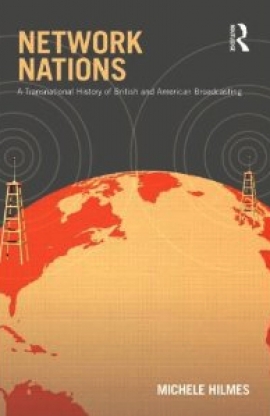
In Network Nations, Michele Hilmes charts the transatlantic history of collaboration, competition, and exchange that has shaped the development of broadcasting in both the United States and Great Britain. It is a much-needed corrective to our own assumptions and the national preoccupations we find in other historical accounts; that is, she argues, the public service tradition in Britain and the commercial model in America are not diametrically opposed broadcasting structures but “together constitute a unified system, a powerful symbiotic machine of cultural influence that has spread long tentacles around the globe and affected the ways that culture is practiced and understood far outside the boundaries of these two nations alone” (4).
Hilmes’ intervention is a crucial one. She detaches media history from its national framework and reconceives it as the product of local, national, and transnational forces. Such a history pulls from the margins moments of resistance and admiration, adaptation and exchange to underscore how they have fundamentally shaped broadcasting practices on both sides of the Atlantic. She also repositions broadcasting at the center of national-cultural formations in both countries, a relationship she argues other theorists and historians of nationalism have given only scant attention. These objectives aren’t contradictory. Rather, they draw critical attention to the ways in which individuals and institutions have negotiated transnational influences amidst frequent collaboration and collusion.
As this excerpt testifies, the two nations drew particularly close during wartime. Both governments enlisted the airwaves to rally support for the war, and in the process of collaboration, the major networks gave birth to one of radio’s most defining genres: broadcast news. Similarly, Hilmes argues, it launched the careers of some of the countries’ most renowned newsmen, including Edward R. Murrow. As radio reporters from America converged on London to cover the war, they honed their craft alongside colleagues at the BBC. Innovations on both sides had a lasting impact on documentary form and technique—cross-fertilization was inevitable.
Insights into Murrow’s experience in London also are indicative of the book’s historiographical value. It’s the sort of rich detail only made possible from tireless hours in the archives. Yet, Hilmes intertwines stories about key people, programs, and organizations with larger concerns about economic structures, policy matters, and national politics. Thus, the excerpt not only illuminates Britain’s growing reliance on radio to draw America away from neutrality into war, but also brings to light “a high point in radio creativity never to be surpassed, with the transatlantic relationship at its heart” (140).






